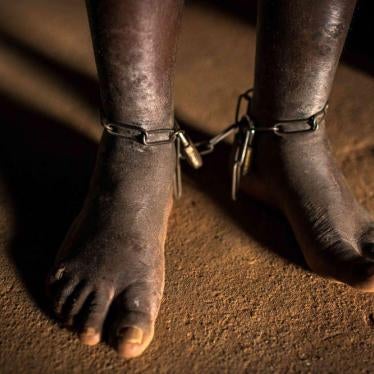January 2023
Human Rights Watch welcomes the opportunity to provide input to the Delegation of the European Union to the Federal Republic of Nigeria & ECOWAS (the “EU Delegation”) ahead of its upcoming Human Rights Dialogue with the Nigerian government.
Shackling of People with Psychosocial Disabilities
In November 2019, after visiting 28 state-run and private facilities across Nigeria and interviewing 124 people, Human Rights Watch published a report, “Nigeria: People With Mental Health Conditions Chained, Abused,” documenting that thousands of people with real or perceived psychosocial disabilities – or mental health conditions – in Nigeria are chained and locked up in various facilities, including state-owned rehabilitation centers, psychiatric hospitals, and faith-based and traditional healing centers.[1]
Human Rights Watch found that deep-rooted problems in Nigeria’s healthcare and welfare systems leave most Nigerians unable to get adequate mental health care or support in their communities. Stigma and misunderstanding about mental health conditions, including the misperception that they are caused by evil spirits or supernatural forces, often prompt relatives to take their loved ones to religious or traditional healing places, where they are held without their consent. Families can take their children to religious and traditional rehabilitation centers for actual or perceived drug use or “deviant” behavior, including skipping school, smoking tobacco or marijuana, or stealing from their parents. Some children in the facilities – some as young as 10 – have been abandoned by their families. In some cases, police arrest people with actual or perceived mental health conditions and send them to government-run rehabilitation centers.
In 27 of the 28 facilities Human Rights Watch visited, all residents had been unlawfully detained. They did not enter the facilities voluntarily and could not leave if they wished to do so.
Furthermore, in 27 of the 28 facilities visited, Human Rights Watch found that staff chained or shackled adults and children, typically with iron chains, around one or both ankles, to heavy objects or to other detainees. The youngest child chained was a 10-year-old boy and the oldest person was an 86-year-old man who also had a visual disability. Some people are chained for a few days at a time as punishment, or for weeks or months to prevent them from moving or leaving.
People who are chained are forced to live in unsanitary conditions. Many must eat, urinate, defecate, and sleep in the same place, usually within the same place where they are confined. Staff often provide a bucket or plastic bag to urinate and defecate in, usually in full view of others. In three facilities, staff did not allow people to bathe regularly.
Chaining can cause serious injuries and psychological distress. Adults and children in some Islamic rehabilitation centers reported being whipped, causing deep wounds. People in Christian healing centers and churches described being denied food for up to three days at a time, which staff characterized as “fasting” for “treatment” purposes. In many of the traditional and religious rehabilitation centers visited, staff forced people with mental health conditions, including children, to eat or drink herbs, in some cases with staff pinning people down to make them swallow. In psychiatric hospitals and government-run rehabilitation centers, staff forcibly administered medication, while some staff admitted to administering electroconvulsive therapy (ECT) to patients without their consent.
The former UN Special Rapporteur on torture, Juan E. Méndez, explicitly noted that shackling “unequivocally amount[s] to torture even if committed by non-State actors under conditions in which the State knows or ought to know about them.”[2]
Recommendations
The EU Strategy for the Rights of Persons with Disabilities 2021-2030 outlines the EU’s commitments in terms of promoting the rights of persons with disabilities globally, confirming its role in upholding the human rights of persons with disabilities and supporting their social inclusion in all international relations, and as part of all external action, policy planning, funding programs and activities, especially in conflict and post-conflict societies or developing countries.
As part of its engagement to promote the rights of people with disabilities, and with a view towards progressively eradicating the horrendous practice of shackling, we encourage the EU Delegation to call upon the Nigerian government to take the following actions:
- Enact a ban on shackling, and ensure that those subject to shackling are freed and provided with appropriate support.
- Comprehensively investigate state and private institutions in which persons with psychosocial disabilities live, including prayer camps, with the goal of stopping chaining and ending other abuses.
- Invest in voluntary and accessible community-based mental health and support services, including development of psychosocial support services and integration of mental health services in the primary healthcare system.
- Conduct public information campaigns to raise awareness about psychosocial disabilities and the rights of people with disabilities, especially among alternative mental health service providers and the broader community, in partnership with people with lived experiences of mental health conditions, faith leaders, and media.
[1] “Nigeria: People With Mental Health Conditions Chained, Abused,” Human Rights Watch news release, November 11, 2019, https://www.hrw.org/news/2019/11/11/nigeria-people-mental-health-conditions-chained-abused. Human Rights Watch has documented the practice of shackling of people with psychosocial disabilities in 60 countries around the world, including in Nigeria. Human Rights Watch, Living in Chains: Shackling of People with Psychosocial Disabilities Worldwide, October 6, 2020, https://www.hrw.org/report/2020/10/06/living-chains/shackling-people-psychosocial-disabilities-worldwide.
[2] UN Human Rights Council (UNHRC), Follow up report of the Special Rapporteur on torture and other cruel, inhuman or degrading treatment or punishment on his follow-up visit to the Republic of Ghana, A/HRC/31/57/Add.2, February 25, 2015, https://undocs.org/en/A/HRC/31/57/Add.2 (accessed January 18, 2023).






